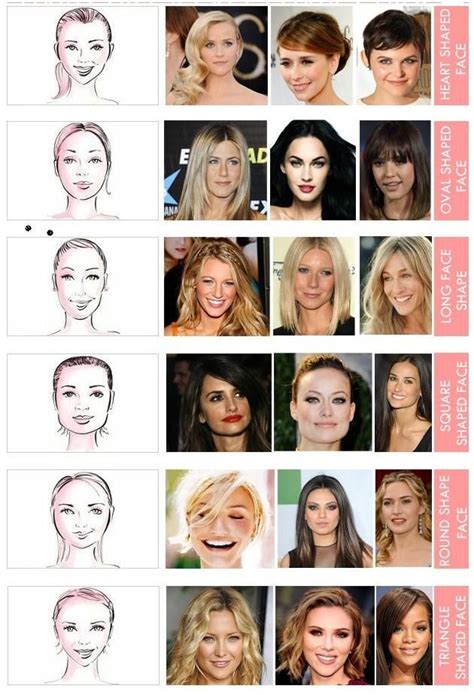Navigating the world of hairstyles can be overwhelming, especially when considering the countless options and endless possibilities. However, understanding your unique face shape can significantly narrow down your search and help you achieve a flattering and harmonious look.

Determining Your Face Shape
Identifying your face shape is the key to choosing the most suitable hairstyles. Here are the common face shapes to consider:
- Oval: Balanced proportions with a slightly longer length than width.
- Round: Rounded contours with a similar width and length.
- Square: Strong jawline and a forehead that is as wide as the jawline.
- Heart: Wider forehead, narrow chin, and a widow’s peak.
- Diamond: Narrow forehead and chin, with wider cheekbones.
- Oblong (Rectangular): Long and narrow, with a jawline that is about the same width as the forehead.
- Triangle: Narrow forehead, wide jawline, and high cheekbones.
Oval Face Shapes
Motivations: Oval faces are considered the most versatile, as they can accommodate a wide range of hairstyles. The goal is to maintain the balance and harmony of the shape.
Pain Points: Avoid cuts that are too short or too long, as they can emphasize the length of the face.
Ideal Hairstyles:
– Medium-length layered cuts
– Bobs with side-swept bangs
– Long, tousled waves
– Pixie cuts with soft, side-swept fringes
Round Face Shapes
Motivations: Round faces aim to elongate and create an illusion of length. The goal is to slim down the face and minimize the width.
Pain Points: Avoid hairstyles that add volume to the sides of the face, such as voluminous bobs or pixie cuts.
Ideal Hairstyles:
– Long, angled bobs
– A-line cuts
– Tapered layers
– Side-swept bangs
Square Face Shapes
Motivations: Square faces seek to soften the angles and create a more oval appearance. The goal is to balance the strong jawline and forehead.
Pain Points: Avoid hairstyles that accentuate the jawline, such as short, blunt cuts or center-parted bangs.
Ideal Hairstyles:
– Long, loose waves
– Graduated bobs with side-swept bangs
– Layered cuts with soft curls
– Side-swept fringes
Heart Face Shapes
Motivations: Heart faces aim to balance the narrow chin and wide forehead. The goal is to create a more harmonious and proportionate look.
Pain Points: Avoid hairstyles that emphasize the pointed chin, such as short, chin-length cuts or wispy bangs.
Ideal Hairstyles:
– Long, side-swept bangs
– Layered cuts with volume at the chin
– Bobs with graduated layers
– Loose, textured curls
Diamond Face Shapes
Motivations: Diamond faces seek to soften the prominent cheekbones and balance the narrow forehead and chin. The goal is to create a more symmetrical appearance.
Pain Points: Avoid hairstyles that add width to the cheekbones, such as blunt bobs or side-parted bangs.
Ideal Hairstyles:
– Long, center-parted bangs
– Graduated bobs with longer layers at the front
– Layered cuts with volume at the crown
– Loose, flowing curls
Oblong (Rectangular) Face Shapes
Motivations: Oblong faces aim to shorten the length and create the illusion of width. The goal is to balance the long, narrow proportions.
Pain Points: Avoid hairstyles that are too short or too long, as they can emphasize the length of the face.
Ideal Hairstyles:
– Medium-length, layered cuts
– Blunt bobs with side-swept bangs
– Chin-length cuts with textured layers
– Pixie cuts with longer sideburns
Triangle Face Shapes
Motivations: Triangle faces seek to balance the wide jawline with the narrow forehead. The goal is to create a more proportional and harmonious appearance.
Pain Points: Avoid hairstyles that add width to the jawline, such as short, blunt cuts or center-parted bangs.
Ideal Hairstyles:
– Long, side-swept bangs
– Graduated bobs with longer layers at the front
– Layered cuts with volume at the forehead
– Soft, textured curls
Additional Tips for Choosing Flattering Hairstyles
- Consider your hair texture and thickness. Thick hair may hold certain styles better than fine or thin hair.
- Consult with a professional hairstylist for personalized advice and recommendations.
- Experiment with different cuts and styles to find what works best for you.
- Pay attention to your own personal preferences and lifestyle. Choose a style that aligns with your personality and routine.
Table: Ideal Hairstyles for Different Face Shapes
| Face Shape | Ideal Hairstyles |
|---|---|
| Oval | Medium-length layered cuts, Bobs with side-swept bangs, Long, tousled waves, Pixie cuts with soft, side-swept fringes |
| Round | Long, angled bobs, A-line cuts, Tapered layers, Side-swept bangs |
| Square | Long, loose waves, Graduated bobs with side-swept bangs, Layered cuts with soft curls, Side-swept fringes |
| Heart | Long, side-swept bangs, Layered cuts with volume at the chin, Bobs with graduated layers, Loose, textured curls |
| Diamond | Long, center-parted bangs, Graduated bobs with longer layers at the front, Layered cuts with volume at the crown, Loose, flowing curls |
| Oblong (Rectangular) | Medium-length, layered cuts, Blunt bobs with side-swept bangs, Chin-length cuts with textured layers, Pixie cuts with longer sideburns |
| Triangle | Long, side-swept bangs, Graduated bobs with longer layers at the front, Layered cuts with volume at the forehead, Soft, textured curls |
Table: Pain Points to Avoid for Different Face Shapes
| Face Shape | Pain Points |
|---|---|
| Oval | Short or long cuts that emphasize the length of the face |
| Round | Hairstyles that add volume to the sides of the face |
| Square | Hairstyles that accentuate the jawline |
| Heart | Hairstyles that emphasize the pointed chin |
| Diamond | Hairstyles that add width to the cheekbones |
| Oblong (Rectangular) | Short or long cuts that emphasize the length of the face |
| Triangle | Hairstyles that add width to the jawline |
Table: Motivations for Choosing Hairstyles for Different Face Shapes
| Face Shape | Motivations |
|---|---|
| Oval | Maintaining balance and harmony |
| Round | Elongating and creating an illusion of length |
| Square | Softening the angles and creating a more oval appearance |
| Heart | Balancing the narrow chin and wide forehead |
| Diamond | Softening the prominent cheekbones and balancing the narrow forehead and chin |
| Oblong (Rectangular) | Shortening the length and creating the illusion of width |
| Triangle | Balancing the wide jawline with the narrow forehead |
Table: Additional Tips for Choosing Flattering Hairstyles
| Tip | Description |
|---|---|
| Hair texture | Consider your hair texture and thickness in choosing a hairstyle |
| Professional consultation | Consult with a professional hairstylist for personalized advice and recommendations |
| Experimentation | Experiment with different cuts and styles to find what works best for you |
| Personal preferences | Choose a style that aligns with your personality and lifestyle |
FAQs
1. What is the best way to determine my face shape?
To determine your face shape, stand in front of a mirror and trace the outline of your face with a dry-erase marker. Then, evaluate the shape of the outline you created.
2. Can I change my face shape with a hairstyle?
While you cannot physically change your face shape, you can use hairstyles to create an illusion of a different shape.
3. What if I have a face shape that doesn’t fit into a specific category?
Many people have face shapes that are a combination of two or more categories. In these cases, consider the characteristics of both shapes and choose a hairstyle that flatters both.
4. How often should I change my hairstyle?
How often you change your hairstyle depends on personal preference. However, it’s recommended to get regular trims to maintain the shape and health of your hair.
5. Can I wear any hairstyle regardless of my face shape?
While you can technically wear any hairstyle you desire, choosing a cut and style that flatters your face shape will result in a more harmonious and polished look.
6. Are there any hairstyles that look good on all face shapes?
Lay
